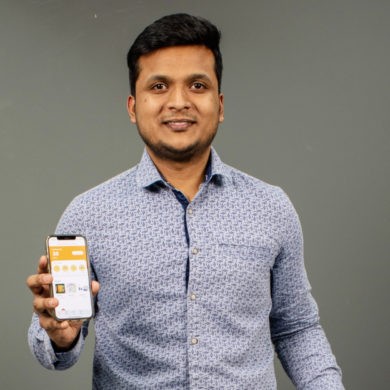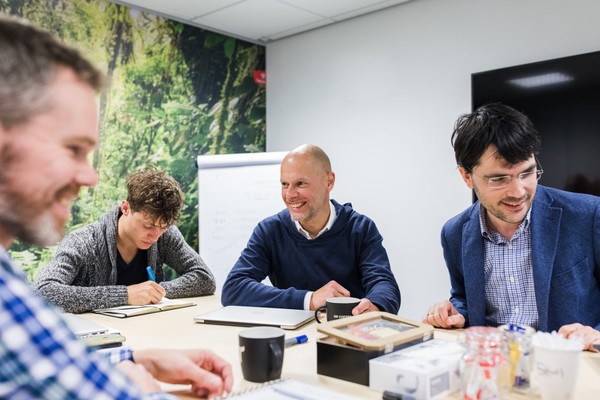cases >> LoopTas
CIRCULAR IOT SYSTEM FOR MORE EFFECTIVE REUSABLE SHOPPING BAGS.

CIRCULAR IOT SYSTEM FOR MORE EFFECTIVE REUSABLE SHOPPING BAGS.
Creating a ‘circular economy’ seems quite the hype nowadays. Udaya Vasepalli contributes to such an economy with his startup LoopTas. He was inspired to start LoopTas due to one of the world’s most serious issues: the plastic waste crisis. The startup wants to solve this problem by reusing discarded products. So how can a startup really stimulate sustainable behavior?
Reusing materials
Having just scanned all your groceries only to realise you forgot to bring a shopping bag: It’s something we can all relate to. You quickly buy a reusable plastic bag which ends up on a pile of other bags in your cupboard. “What most of the customers don’t know is that the reusable bags – that have become the standard after the ban on free single-use plastic bags – are actually even less sustainable.” Especially when you keep forgetting to bring them along on your next trip to the grocery store. “Because those bags contain up to five times as much plastic as the traditional single-use bags,” Udaya explains.
LoopTas created a 100% circular and sustainable product with an NFC (Near Field Communication) system for reusable shopping bags with not only a return option but also a rewards system. The system can be integrated into any reusable bag. It’s not constrained to foldable bags. “Our bags are made out of 100% recycled materials. Especially for recycled PET, we are working with the Canadian-based organization Plastic Bank, which has ethical recycling ecosystems in coastal communities (like Haiti, Brazil, Indonesia, the Philippines). They reprocess the materials for reintroduction into the global manufacturing supply chain,” Udaya explains. And another upside: the bag can be folded into pocket size.
Rewarding sustainability
Reusing the bag seems such an easy task, especially if you received a reward. LoopTas not only rewards consumers for bringing their own bag to the supermarket checkout, but also enables them to receive points for returning (others´) discarded bags.
For a small deposit, a user can borrow a LoopTas in the store. If the user returns the bag and scans the NFC tag in their LoopTas app, they receive points as a reward. Those points can be redeemed for a donation to charities like Tree-nation, Made blue and Plastic Bank. Or they can be used to buy a voucher for a sustainable item from the supermarket shelves. “A sustainable item mostly costs more than the traditional one. By giving out rewards to buy a sustainable product with a discount, we hope to minimize the barrier to purchase sustainable items and make more people contribute to a sustainable world.“
Upcoming pilots
Almost everybody is willing to contribute to a sustainable, circular economy, but most people are not proactive. Not even in the smallest way, such as reusing a shopping bag. Creating the right approach and a strong business model was quite a challenge, according to Udaya. “The business coaches at Novel-T and especially Tim de Kraker as my startup’s business advisor, guided me from the beginning to validate the value proposition and business model.” And that support has been really effective. LoopTas is starting a couple of pilots with Dirk van den Broek stores as well as the UT campus-based Coop supermarket. Udaya: “Being able to use Novel-T’s network has provided me with a lot of new contacts and opportunities. With the pilots, we aim to demonstrate the whole LoopTas process, gather customer feedback, and expand to more Dirk van den Broek and Coop stores across the Netherlands.”
Do you want to enrich the world with your innovative business idea? Sign up for our Bootcamp and discover if entrepreneurship is for you!

"By giving out rewards to buy a sustainable product with a discount, we hope to minimize the barrier to purchase sustainable items and make more people contribute to a sustainable world."
Udaya Vasepalli
CEO of LoopTasMore about
LoopTas
Creating a ‘circular economy’ seems quite the hype nowadays. Udaya Vasepalli contributes to such an economy with his startup LoopTas. He was inspired to start LoopTas due to one of the world’s most serious issues: the plastic waste crisis. The startup wants to solve this problem by reusing discarded products. So how can a startup really stimulate sustainable behavior?






